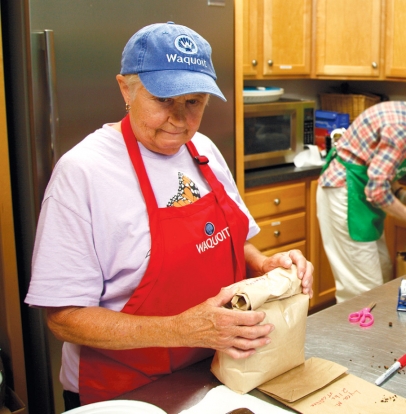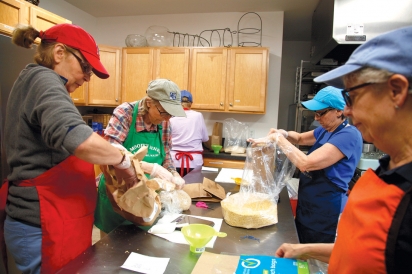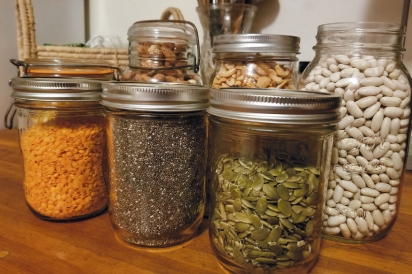Waquoit Zero Waste Buying Club
It’s the third Tuesday of the month, and all is quiet in the parish hall at Waquoit Congregational Church. Jan Smith-Rushton dons her apron and cap, and starts opening boxes labeled with vodka and gin logos.
She’s not having an illicit party. Smith- Rushton is splitting an order for the Waquoit Zero Waste Buying Club (W0W), which arrives at the Falmouth church in boxes upcycled from the New Hampshire State Liquor Store.
With the help of other members, the $500 order will be weighed, sorted into reusable glass or paper containers, and returned to those boxes for pickup by a dozen households in about two hours. The effort is worth it, says Smith-Rushton, to avoid all the plastic packaging normally associated with grocery shopping. An estimated 40% of the plastic produced in the world is single-use packaging, mostly for food1. That’s 161 million tons a year.
The idea for a coop sprouted in 2018, after the owners of Amber Waves, a natural food store in Falmouth, retired after 40 years in business. Bereft of a local bulk-buying option, and finding the options at other stores to be limited, a group of like-minded people starting brainstorming ways to form an informal coop. Their mission: provide access to organic food at wholesale prices, reduce packaging waste, build a sense of community through shared food and work, reduce their carbon food print, and redirect food dollars from multinational chains to small, regional farmers and businesses.
Nearly a year after that initial meeting, the Waquoit Congregational Church’s Green Team began organizing a monthly order from Associated Buyers, a specialty food distributor based in Barrington, New Hampshire. The group started out with items like organic flour and nuts that members wanted to share. They celebrated with a plastic-free potluck featuring the foods from their bulk order. “The food was all wonderful, and there was basically no waste, from cooking to cleaning,” said W0W member Pam Polloni.
Over the next few months, the group branched out to the thousands of specialty goods from the Associated Buyers catalogue. Come spring, members could complete their own orders online. This summer, they reached $5000 in cumulative orders and were able to eliminate the 10% delivery fee.
Not only does bulk-buying reduce packaging, purchasing directly from Associated Buyers ensures that members’ food dollars support New England farmers, Smith-Rushton says. The catalogue offers products from Maine Grains, King Arthur, Grafton Village and Vermont Farmstead Cheese Company, and dozens of other regional producers, although national brands and imported foods are also available.
“We’re working on redirecting our food dollars from multinational chains to local. Our intention is to support local and regional farmers wherever we can,” Smith-Rushton says.
As the five women weighed out jars of millet, muesli and steel-cut oats, Smith- Ruston noted that achieving zero waste—and lower costs—depends on cooperation. For example, if one member wants five pounds of flour, it is cheaper (and requires less packaging) to order a 25-pound bag and split it five ways. The price for a few pounds of peanut butter is lower per unit than individual jars. Still, members can order just one item at a time, often for significant savings. A two-pound bag of Equal Exchange coffee beans costs $19, which is roughly half the price one would pay in a grocery store (although it does come in a plastic package).
Though some individual items like coffee beans, granola and peanut butter still come in plastic packaging, Smith-Rushton says the group is largely able to eliminate the waste. They use glass mason jars (sterilized in the church’s ServSafe-certified kitchen) or members’ own cloth bags for the bulk items, and use the plain cardboard boxes and paper packaging as weed blocker in their gardens.
Between the bulk-buying club, the Falmouth Farmers’ Market and her membership (and volunteering) in the Pariah Dog Farm CSA, Smith-Rushton says she rarely needs to visit a grocery store. It’s simply a matter of buying for a month, rather than a week at a time, and making some things, like yogurt and jam, from scratch.
“Since we’ve been doing this, I see a huge difference in what I have to buy at a grocery store. If I do go, it’s really depressing to see all that plastic,” Smith-Rushton says. “If enough people start capturing the vision that they have control over their food, and the packaging, then we don’t have to live the way that the corporations try to sell us.”
While the Waquoit Zero Waste Buying Club is still working out the kinks of ordering, splitting and refunding out-of-stock items, they are open to new members, who pay a sliding scale membership fee and a small volunteering commitment. Or better yet, people can start their own group and bring the zero waste lifestyle to their own neighborhoods.
Contact wowbulkgroup@gmail.com for more information.
1 National Geographic story – source is Roland Geyer, University of California Santa Barbara news.nationalgeographic.com/2018/05/plastics-factsinfographics-ocean-pollution/







